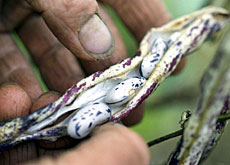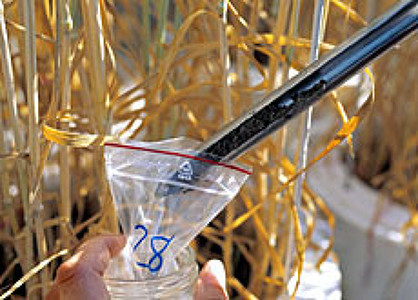Uncertainties swayed voters at the ballot box

Scepticism and fear of the unknown were clear in Sunday's votes on genetically modified organisms and Sunday trading, analyst Georg Lutz tells swissinfo.
The electorate clearly approved a people’s initiative for a five-year moratorium on GMOs and narrowly voted to ease restrictions governing Sunday trading at major public transport hubs.
The political scientist from Bern University says voters were wary of GMO technology and of even “modest reform” on the Sunday trading issue.
swissinfo: What kind of signal do the results of the votes send to the government?
Georg Lutz.: Not that strong because they were partly expected, particularly when it comes to the GMO vote. It was clear there was great scepticism among the population and that it [the moratorium] might get a “yes”.
The other result [Sunday trading] was maybe a bit more unexpected and it was such a narrow result at the end. The signal this will send to the government and parliament is that they have to be careful what steps and what speed they take towards further liberalisation.
swissinfo: In political terms, who are the winners and who are the losers?
G.L.: In the GMO vote I think the winners are the consumer groups and the farmers who were in favour of this initiative. It’s a bit more difficult to say in the Sunday trading vote because on television the group that lost by a very narrow margin were much happier than the ones that won.
swissinfo: Did you expect the Sunday trading vote to be so close?
G.L.: If you looked at the surveys that were done before, one would have expected a clearer “yes”, but one of the aspects that proved to be important was the mobilisation within the church-oriented conservative camp. It was this camp that mobilised [voters] very well and made the result so close.
swissinfo: The majority of cantons voted against a relaxation of the Sunday trading laws and yet the people actually voted in favour. What does that tell you?
G.L.: In this case it was the big centres like Bern, Basel, Geneva and most of all Zurich, which actually swayed it. The country areas are more conservative and would not have had much benefit from it because there are no big shopping centres in their [railway] stations.
swissinfo: The acceptance of the moratorium on GMOs was pretty clear. Why was this the case?
G.L.: All the surveys showed a great scepticism in the population towards GMO food and the technology [it involves] in general. There is probably quite a strong fear and uncertainty about the long-term consequences of that. This result was probably not a great surprise.
swissinfo: To what extent did emotions play a role in that vote?
G.L.: To a great extent because it’s something that no one really understands. Most people don’t know what it’s good for either, and in this situation probably many people said to themselves that it can be dangerous and therefore we’d better vote for it [the moratorium].
swissinfo: Retailers didn’t seem to say much on the GMO issue before the vote. Is this because they know that the general public in Switzerland isn’t interested in buying genetically modified products?
G.L.: Exactly, they have no interest in campaigning for them [GM products]. The consumers don’t seem to want them. As soon as retailers have to label something “genetically modified” people won’t buy it any more so there’s no incentive whatsoever for them to campaign in favour of it.
swissinfo-interview: Robert Brookes
The five-year moratorium on GMOs in Swiss agriculture was approved by 55.7% of voters and all 26 cantons.
The revised labour law, aimed at easing restrictions on Sunday shopping at major railway stations and airports, was accepted by 50.6% of voters, mainly in urban areas.
Voter turnout was 42%.

In compliance with the JTI standards
More: SWI swissinfo.ch certified by the Journalism Trust Initiative










You can find an overview of ongoing debates with our journalists here . Please join us!
If you want to start a conversation about a topic raised in this article or want to report factual errors, email us at english@swissinfo.ch.